Hello everyone. I’m Maud, and I’m in my first year of an undergrad degree in Japanese and Japanese culture at Cambridge University in the UK. I’ve been invited to talk briefly about how my experience of MIRAI 2015 has been, what we’ve done, and what I’ve learned, but before I do so, I’d like to extend a huge thank you to MOFA for giving us all such an amazing opportunity. Everyone I’ve met here is having a profoundly incredible time – I know I am – and we are so lucky to be here, so thank you so much. I think everyone would agree that the opportunities we’ve been given on this programme are extremely special and that the level of organisation has been phenomenal, to coordinate such a large group of people on such a tightly packed schedule. Thank you so much.
I’m actually going to start at the end in talking about my experience of MIRAI 2015. At the airport in Fukuoka, where my trio did our homestay, the host father of a friend, as he hugged him, said, ‘you are my son’. Meanwhile, I was in tears, literally, at having to say goodbye to my eighteen year old host sister, with whom I’d become really good friends.
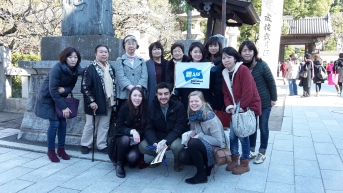
These were people we had known for under three days. But such is the power of an exchange programme – being invited into the most intimate of cultural settings, the home, forces you to form really strong bonds with these people who care for you, something that cannot be recreated in the classroom. In fact, when I asked my host sister to encapsulate Japanese culture in three words, one of her words was ‘hospitality’. And I know I have been made to feel so so welcome in this country. I think we all feel this way.
It was incredible noticing the differences between everyone’s attitudes at the beginning and at the end of the week. On Wednesday, as I know you all recall, we had our first ICL (intercultural learning) session, and we learnt about describing, interpreting, verifying and evaluating as we experienced things. I think people at this point were a little tentative to share, and we felt we hadn’t experienced enough of Japan yet to offer up much insight beyond first impressions. But as the week went on, we did so much in so little time, that in Sunday night’s ICL session, everyone had so much to say and to share, and so much passion. And when Ingvild (our session
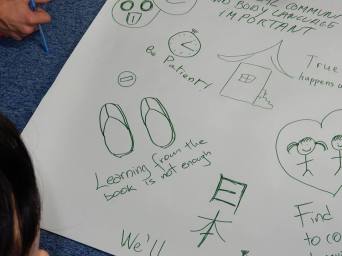
leader) asked for those who wanted to return to Japan to sit down, every single person in the room sat down and began applauding, which mixed with applause from the session next door to us. It was a powerful moment.
My experiences in Japan on this programme were culture-based, so I went to the Edo-Tokyo Museum and participated in the culture lectures at Keio University. I have never seen a museum like the Edo-Tokyo – the huge recreations of buildings from different periods, and the attention to detail, was amazing. It was really interesting also to learn more about the history of the Tokyo we are staying in now. We see modern city blocks, the Rainbow Bridge, and mega-corporations, and it was fascinating to learn about the city hidden beneath the city. This semi-secret history is much like the iceberg analogy of visible and invisible culture that we learnt about in the global competence certificate online modules.
On the same day, we visited the Mori Building Corporation, which was a completely different type of interesting. Not only was the view amazing, and it housed an awesome exhibition of modern Japanese art, but seeing a 1:1000 scale model of the city of Tokyo and hearing about the corporation’s dreams for city planning gave us an informative vision of modern Japan and its future, for example, the hosting of the 2020 olympics and the designs for more underground development, so that nature can flourish on the surface level.
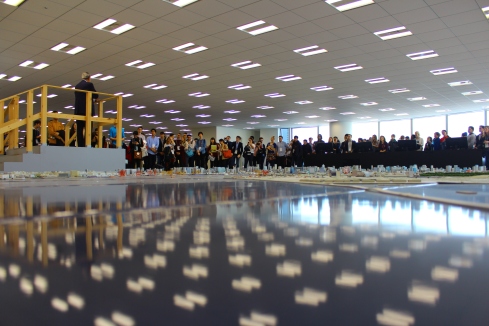
So already it is clear that in just one day, we learnt about the past, present and future of this incredible country, where innovation and tradition coexist in a really unique way. For me, this contrast defined the programme. Today, we visited the mega-corporations of Itochu and Rakuten, and learnt about the spreading of the Japanese brand on a global level, hearing from employees and even from the chairman of Itochu himself about methods of management, business development, and corporate philosophy, and why those corporations are unique to Japan. And yet on the same day, we visited Meiji Jingu, met and spoke with Shinto priests, saw a Shinto wedding, and had a guided tour of the inside of the shrine, which is not something just everyone can do. This, for me, was especially amazing as an experience, and I am genuinely considering becoming a Shinto priestess now. This is just one example of the massive impact this programme has had on future plans, mine and other people’s.
On Wednesday, we had the opportunity to attend seminars at Keio University and speak with students and lecturers there. Again, this wa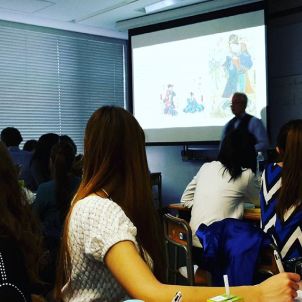 s a really special experience that not just everyone can easily get the chance to do. In the opening remarks, we learnt about the importance of creating a ‘non-war community’, and how we can do that in East Asia through mutual understanding and trust, and accumulating more experience, for example, through youth exchanges. We also heard a lecture from Professor Tanaka, a famous scholar in Japan of international political relations who lectures at Tokyo University. He talked about Japan’s place in Asia in the 20-21st century, giving us context from the earliest times as well. After this we split off into groups of economics, politics and culture and society. In the culture and society group, we heard a lecture about popular culture in the Edo period from Professor Taniguchi, who works with Prime Minister Abe – again, another incredible opportunity to hear him speak and ask him questions. In the afternoon, we discussed with Keio students about how popular culture enhances Japan’s international reputation. Our conversations were really interesting, and we moved into various other topics as well, for example, the importance of exchanges. No matter how much you learn in a classroom in your native country, it is not the same as visiting a country firsthand. I doubt you will form a strong emotional connection with a textbook, for example. Visiting Japan has had such a profound effect on everyone here. I think we have all done something for the first time. I spoke with a girl who saw the sea for the
s a really special experience that not just everyone can easily get the chance to do. In the opening remarks, we learnt about the importance of creating a ‘non-war community’, and how we can do that in East Asia through mutual understanding and trust, and accumulating more experience, for example, through youth exchanges. We also heard a lecture from Professor Tanaka, a famous scholar in Japan of international political relations who lectures at Tokyo University. He talked about Japan’s place in Asia in the 20-21st century, giving us context from the earliest times as well. After this we split off into groups of economics, politics and culture and society. In the culture and society group, we heard a lecture about popular culture in the Edo period from Professor Taniguchi, who works with Prime Minister Abe – again, another incredible opportunity to hear him speak and ask him questions. In the afternoon, we discussed with Keio students about how popular culture enhances Japan’s international reputation. Our conversations were really interesting, and we moved into various other topics as well, for example, the importance of exchanges. No matter how much you learn in a classroom in your native country, it is not the same as visiting a country firsthand. I doubt you will form a strong emotional connection with a textbook, for example. Visiting Japan has had such a profound effect on everyone here. I think we have all done something for the first time. I spoke with a girl who saw the sea for the 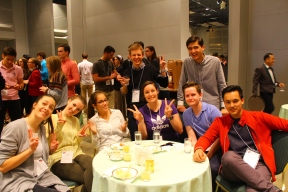 first time in Japan. But from huge things like that, to little, intimate things, like eating rice with chicken and egg for breakfast, sleeping on a futon, or seeing mountains from your window. There are things about culture that you do not even realise other countries do differently until you are there experiencing it. And again, on my homestay, I did a mix of old cultural things, for example, we visited a Shinto shrine – where there were bridges representing the past and the future, I had my fortune read, and I learnt about what my host family do on New Year’s Day. I also ate lots of traditional food like red bean mochi and okonomiyaki. We even went for seafood barbecue, where I ate oysters for the first time, as well as some other sea creatures that I couldn’t – and still can’t – identify. But it was all delicious! But we also experienced modern culture, like visiting a manga museum and the Toto toilet museum – only in this country is visiting a toilet museum a really cool thing to do. I went to the top of Fukuoka Tower, and went to a photo booth in the trendy part of Fukuoka where all the youth hang out, and the streets are filled with fashionable teenagers and kawaii culture.
first time in Japan. But from huge things like that, to little, intimate things, like eating rice with chicken and egg for breakfast, sleeping on a futon, or seeing mountains from your window. There are things about culture that you do not even realise other countries do differently until you are there experiencing it. And again, on my homestay, I did a mix of old cultural things, for example, we visited a Shinto shrine – where there were bridges representing the past and the future, I had my fortune read, and I learnt about what my host family do on New Year’s Day. I also ate lots of traditional food like red bean mochi and okonomiyaki. We even went for seafood barbecue, where I ate oysters for the first time, as well as some other sea creatures that I couldn’t – and still can’t – identify. But it was all delicious! But we also experienced modern culture, like visiting a manga museum and the Toto toilet museum – only in this country is visiting a toilet museum a really cool thing to do. I went to the top of Fukuoka Tower, and went to a photo booth in the trendy part of Fukuoka where all the youth hang out, and the streets are filled with fashionable teenagers and kawaii culture.
We did so much in so little time that I honestly cannot believe it has only been a week. I’ve made such close friends on this trip, learnt so much about Japanese culture, improved my Japanese language skills, and even had new thoughts about my future plans. I believe now more so than ever in the importance of exchange programmes. Cultural dialogues are absolutely essential to improving mutual understanding and acceptance of differences, and in doing so, creating a more peaceful world community and better diplomacy, and ending world conflict. The MIRAI programme has been so, so amazing, and again, I want to say a huge thank you to everyone who is involved in it. It was so well put together and we did so many different things, I met so many people from all over the world, and I definitely feel like a more globally minded and inter culturally educated world citizen. When I get home to England I will definitely be telling everyone I know (and don’t know!) about the programme, and I’d definitely like to get involved with AFS in my own country. So thank you so much for everything.
Thank you for listening.
Text by MIRAI program participant Maud Rowell.








Leave a comment